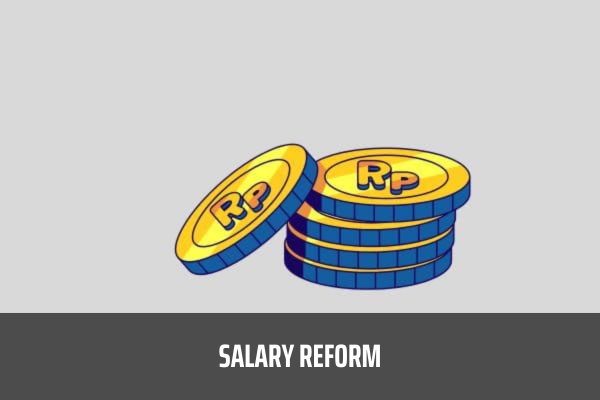Who will have their salary and income levels preserved after the salary reform in Vietnam in 2024 under the Resolution 27?
- Who will have their salary and income levels preserved after the salary reform in Vietnam in 2024 under the Resolution 27?
- Vietnam: Which allowances and remunerations will be annulled according to Resolution 27?
- Will the payrolls applicable to officials increase by 30% after the salary reform in Vietnam in 2024?
Who will have their salary and income levels preserved after the salary reform in Vietnam in 2024 under the Resolution 27?
Starting from July 1, 2024, comprehensive salary policy reforms will be implemented according to Resolution 27-NQ/TW in 2018.
Pursuant to Resolution 27-NQ/TW in 2018, the resolution establishes the following new payrolls:
- Annulling the current statutory pay rate and salary coefficient, and establishing a new base salary with specific amounts in the new payrolls.
- Determining the minimum salary level for officials and public employees in the public sector as the salary of individuals with intermediate-level training requirements (level 1), not lower than the minimum salary level of trained labor in the private sector.
- Expanding the salary relationship as a basis for determining specific salary levels in the payroll system, gradually approaching the salary relationship in the private sector that is suitable for the state's resources.
- Improving the regular salary promotion and early salary promotion system for officials, public employees, and armed forces personnel in accordance with the provisions of the new payrolls.
Regarding salary information for officials and public employees in specialized units, Minister Pham Thi Thanh Tra stated that under Resolution 27, we will annul specific salary and income mechanisms and policies. Currently, there are 134,284 officials in state administrative agencies applying specific financial and income mechanisms (with additional salary beyond the general regime ranging from 0.66 to 2.43 times). This number accounts for about 6.78% of the total number of officials and public employees in the country.
When annulling the specific salary and income mechanisms and policies, they will receive a new salary (including allowances) that may be lower than before the salary reform. Therefore, to ensure their entitlements, the Ministry of Home Affairs will calculate and propose the competent authority to consider preserving the current salary and income levels.
In other words, the new salary (including preserved levels) of these officials and public employees will not be lower than before the implementation of the salary reform, in line with the spirit of Resolution 27 and ensuring fairness between individuals who receive salaries before and after the salary reform.
Therefore, during the implementation of the salary reform in 2024, the 134,284 officials in state administrative agencies applying specific financial and income mechanisms will have their current salary and income levels preserved to ensure that their new salary (including preserved levels) will not be lower than before the salary reform, in accordance with the spirit of Resolution 27.
Source: Government Electronic Portal

Who will have their salary and income levels preserved after the salary reform in Vietnam in 2024 under the Resolution 27?
Vietnam: Which allowances and remunerations will be annulled according to Resolution 27?
Pursuant to Resolution 27-NQ/TW in 2018, when implementing the salary reform in 2024, the following allowances and remunerations will be annulled:
Annulled allowances include:
- Seniority allowance (except for the military, police, and cipher officers to ensure the salary ratio with officials).
- Leadership position allowance (as leadership positions in the political system determine salary levels).
- Party and social-political organization work allowances.
- Official duty allowances (as they have been included in the basic salary).
- Hazardous and dangerous allowances (as hazardous and dangerous working conditions are included in occupation-based allowances).
Remunerations or other payments beyond the salary of officials and public employees originating from the state budget will be annulled:
- Remunerations for meeting.
- Remunerations for drafting legal documents, projects, workshops, etc.
Furthermore, for payments beyond the state budget, the following measures will be implemented:
- Implementing lump-sum salary funds for downsizing for agencies and units.
- Expanding the lump-sum budget mechanism based on task performance results.
- Not linking the salary level of officials and public employees to the development, revision, or supplementation of policies and regulations without a salary nature.
- Studying the regulation of lump-sum allowances for non-salary benefits (such as cars, phones, etc.).
- Only issuing new policies and regulations when resources for implementation have been arranged and balanced.
Will the payrolls applicable to officials increase by 30% after the salary reform in Vietnam in 2024?
According to the Government Electronic Portal, the Minister of Home Affairs stated that under the salary reform plan, starting from July 1, it is expected that the average salary of officials and public employees will increase by about 30% (including both the basic salary and allowances).
From 2025 onwards, this salary level will continue to be adjusted annually, on average, by about 7%.
Although we have not implemented the salary reform in the past three years, the basic salary has been adjusted twice, resulting in a 29.5% increase. Therefore, when calculating from 2021 (the expected implementation time of the salary reform according to the spirit of Resolution 27-NQ/TW in 2018) until July 1, the salary of officials and public employees has increased significantly, averaging about 60%. While this figure may not be extraordinary, it represents a considerable increase compared to the average annual increase of 7% without salary reform.
Therefore, when implementing the salary reform policy on July 1, 2024, the salary of officials based on their positions is expected to increase by approximately 30% (including both the basic salary and allowances).
From 2025 onwards, the salary of officials based on their positions will continue to be adjusted annually, on average, by about 7%.
LawNet